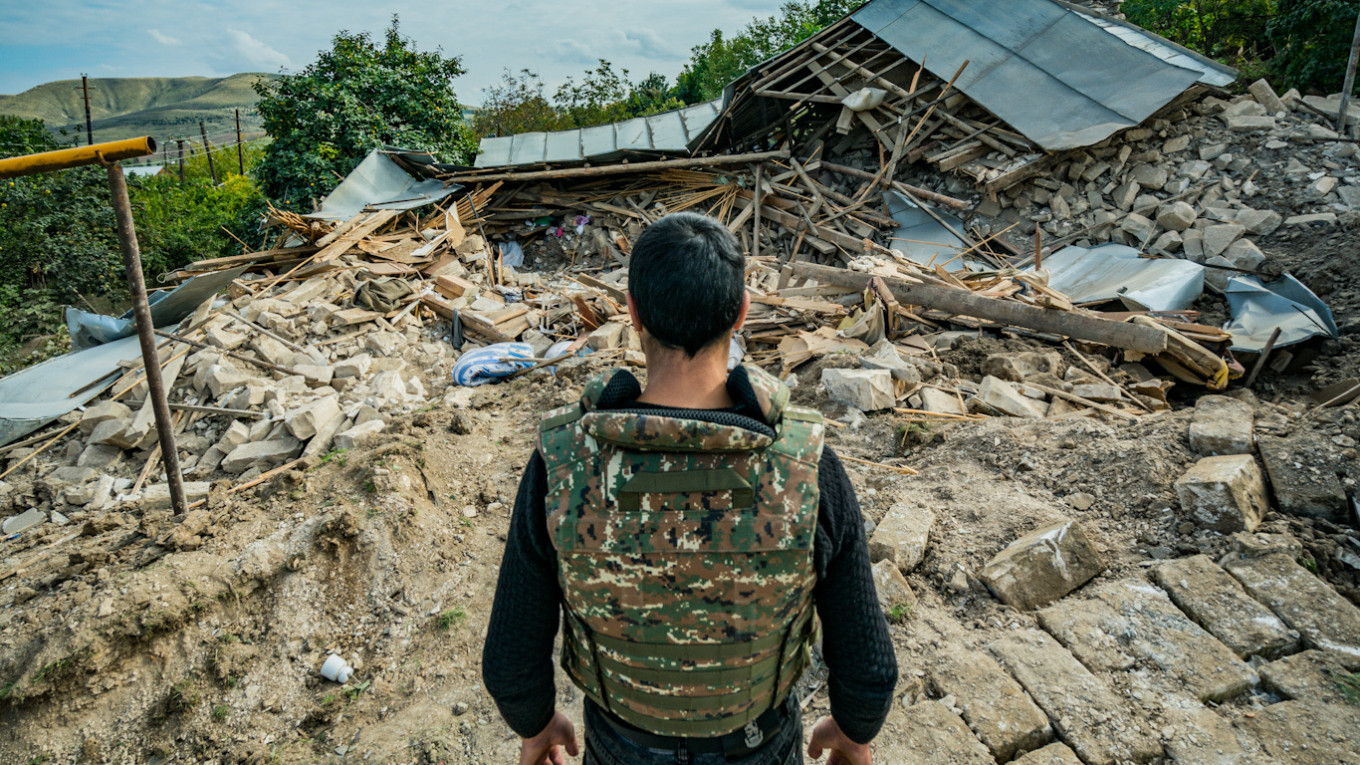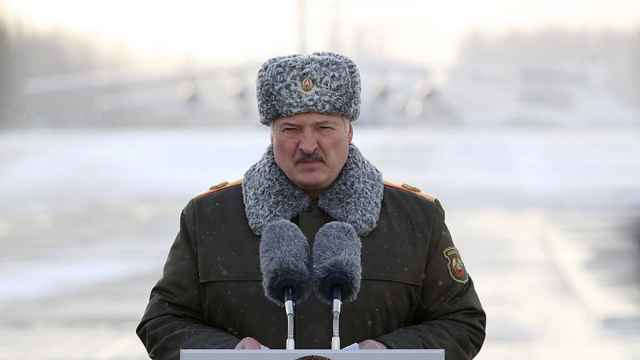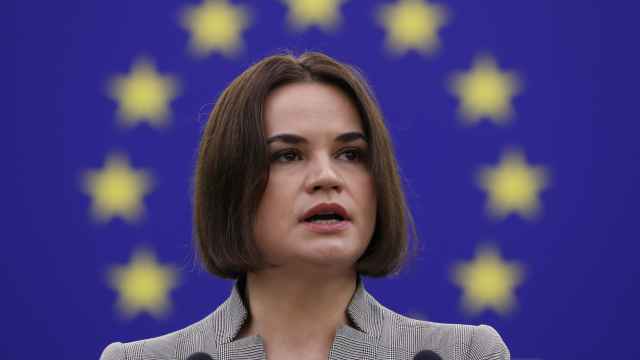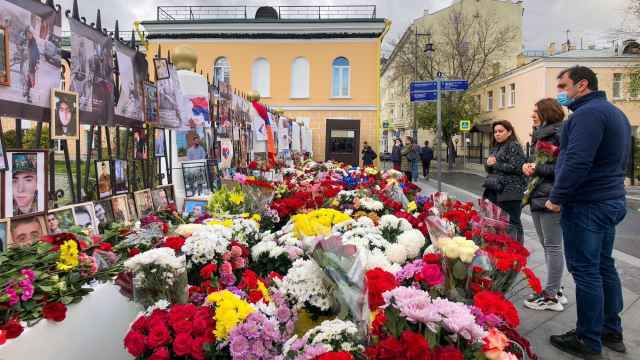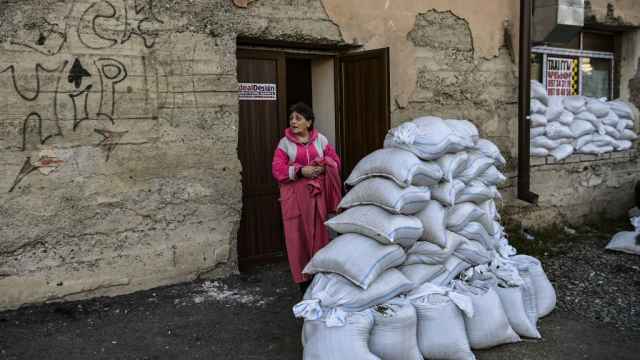It just doesn’t quite add up. Russia continues to be accused of meddling in the U.S. elections and a host of other Western countries. Moscow has annexed Crimea from Ukraine, pushed into the Middle East and seemingly pushed the U.S. out of Syria. Its mercenaries have been spotted as far out as Venezuela, and it is moving into Africa. Why, then, are we suddenly seeing three conflicts — in Belarus, Kyrgyzstan and Nagorno-Karabakh — raging on its periphery, with Russia seemingly doing little to resolve them?
Despite repeated fears in the West about plans for Moscow to use force to back dictator Alexander Lukashenko in Belarus, who has been violently suppressing protests against his disputed re-election since August, its touted “interference” has amounted to mainly talk — behind the scenes at that — and little action.
With regard to Kyrgyzstan, where violent protests toppled the presidency of Russian ally Sooronbay Jeenbekov following disputed Oct. 4 elections, Moscow suspended financial aid “until the situation stabilizes.”
In the disputed region of Nagorno-Karabakh, where hostilities resumed last month amid a Turkey-backed offensive by Azerbaijan to retake territories from Armenia, Russia has brokered a fragile ceasefire that few expect to hold, but is refusing to commit to any security guarantees. The question remains of why it isn’t doing more to help Armenia, which it is under obligation to protect as a member of the Collective Security Treaty Organization.
So it’s not that Moscow is silent about this instability or doing nothing at all. In all three cases, it has conducted considerable diplomacy. But that is simply what it must do. Nevertheless, it has become almost a maxim: in Belarus, Moscow’s options are limited; in Nagorno-Karabakh all its options are bad, and in Kyrgyzstan it’s worried but not talking about its options.
How can it be that a country touted as growing so aggressive on the world stage is powerless to contain instability on its own borders?
There are three broad reasons. The first and obvious one is that Russia’s political and economic resources are focused on battling the crisis at home, and in that it is hardly unique. Covid-19 has posed innumerable and often unanswerable challenges of how to mitigate saving lives with economic costs for most countries. With a challenge that serious, it is often hard to shift adequate strategic focus to other, more traditional policy areas.
The second reason is more structural and complex. Russia’s involvement in its near abroad relies on multilayered approaches that are economic, cultural, political and strategic. It also rests a great deal on balancing and leveraging relations with multiple players, both strong and weak.
In the case of Nagorno-Karabakh, it won’t move more robustly to protect Armenia because it risks disrupting the careful balance it has constructed with its frenemy, Turkey, and which has allowed it to broker agreements in Syria and generally become regarded as the go-to broker in the Middle East.
Russia also risks alienating Azerbaijan, which, given its shrinking clout in the former Soviet space — it has already lost the Baltics, Georgia and Ukraine — it cannot afford to do. Russian foreign policy in this area is like a game of Jenga — so multilayered and complicated that removing one little block at the wrong time risks making the whole edifice crumble.
But the third and most important reason concerns our perception of Russia and its foreign policy compared with the reality. Since 2014, when Russia annexed Crimea and interfered militarily in Ukraine to prop up the pro-Russian separatist states of the Donetsk and Lugansk People’s Republics, Moscow has come to be regarded as aggressively imposing itself on the world.
Its foreign policy escapades since then — the 2016 interference in U.S. elections, its military backing of Syria’s Bashar Assad, its unsuccessful coup attempt in Montenegro in 2016, and its support of Nicolas Maduro in Venezuela — all fall within that narrative. But barring Syria, where Russian airpower did indeed ensure that Assad’s regime recaptured territories, its actual influence has been more illusory than real. Even its involvement in Donbas was confusing, incoherent and hardly successful.
Unsuccessful efforts to get it to mediate the conflict in Libya, the failure of agreements with Turkey on Idlib in Syria and its reluctant support of Maduro all demonstrate a semblance of clout without much evidence of delivery.
In the United States, Russia has succeeded in making everybody believe in the existence of a robust interference campaign with little evidence to suggest that it actually stacked the cards. Instead, what we see on the world stage is an assortment of uncoordinated attempts to get involved and show its presence without actually shaping the world to its will.
As one former official remarked to me, Vladimir Putin’s foreign policy has been about “ticking boxes,” of having various agencies, both public and private, establish a presence in foreign countries either to disrupt or influence, but without a coherent strategy for an actual end.
In effect, Crimea was the aberration, not the rule, of Putin’s otherwise risk-averse foreign policy. His actions there in 2014 created an image of a Russia more powerful than it actually is, an image that Russia has sought to bolster since then. But while it has capitalized on that image, that too has been more about optics than substance.
As the instability on Russia’s borders demonstrates, nowhere do those optics of its power prove as powerless as in its near abroad.
A Message from The Moscow Times:
Dear readers,
We are facing unprecedented challenges. Russia's Prosecutor General's Office has designated The Moscow Times as an "undesirable" organization, criminalizing our work and putting our staff at risk of prosecution. This follows our earlier unjust labeling as a "foreign agent."
These actions are direct attempts to silence independent journalism in Russia. The authorities claim our work "discredits the decisions of the Russian leadership." We see things differently: we strive to provide accurate, unbiased reporting on Russia.
We, the journalists of The Moscow Times, refuse to be silenced. But to continue our work, we need your help.
Your support, no matter how small, makes a world of difference. If you can, please support us monthly starting from just $2. It's quick to set up, and every contribution makes a significant impact.
By supporting The Moscow Times, you're defending open, independent journalism in the face of repression. Thank you for standing with us.
Remind me later.



